- No products in the cart.
The concept of deionization of water started several years ago with scientist coming up with the idea that water is safe for drinking when it is pure. Deionized water is one in which all the mineral components in it such as Calcium, Iron, Chloride, and Sodium are removed. Deionized water is clean and safe for drinking and it taste safe. Deionized water contains no harmful substance or harmful chemical. This type of water is mostly used by manufacturing process in manufacturing firms, laboratories, pharmaceutical for experimental purposes. Produced by removing all the ions present in it, it has no charge. For years now it has been found useful for the production of different products present in the market. This article aims to discuss the possibility of Deionized water leading to corrosion by looking at practical cases which in which Deionized water can result in corrosion. It also aims to discuss how to avoid the corrosive effect of Deionized water in the lab.
Can Deionized water lead to corrosion?
The following practical cases show how Deionized can result in corrosion.
-
If you consider yourself working in a medical service department where devices are produced to be used for heating a patient, it is possible for you to get a sign showing the possibility of corrosion. This is caused by the present of Deionized water. In a case where water is in constant recirculation, there are possibilities of the deionized water dissolving more quantity of the copper or the stainless in order to make itself less corrosive to the stainless. On the other hand, if you are exchanging the water and you see a possibility of seeing corrosion, you should consider adding little amount of Sodium carbonate or a non-halogen soluble salt to the water in order to reduce the corrosion. To avoid the possibility of seeing corrosion it is advisable to avoid chlorides, fluorides, iodides and bromide, and try to keep pH concentration of the water neutral or slightly basic.
-
In some cases during the storage of Deionized water, there might be the possibility of an increase in the conductivity of Deionized water. This could result from the calcium chloride used. In such case, to maintain stability in the pH level of the water and prevent corrosion, it is advisable to add Potassium permanganate. Also one of the factors that can increase corrosion in such a scenario is the fact that conductivity of water in the tank increases due to the absorption of CO2 present in the air. The CO2 converts to carbonic acid in the water which causes the conductivity of the water to increase and the pH level to go down to around 5.6.
Deionized water when in contact with carbon steel can result in corrosion because of its low hardness content. Hard waters with calcium carbonate present in it can be protective due to the protective layer deposited on the surface of the steel. Deionized waters which are commonly prepared and stored in stainless steels, just as the carbon steels will contaminate pure waters.

Pictured: RICCA Brand WATER D.I. (Deionized Water) Water, ACS Reagent Grade, ASTM Type I, ASTM Type II
How to prevent corrosion of water
-
Using tin-plated containers - Metal or alloy container used in the storage of water should always be tin plated in order to avoid the possibility of corrosion by deionized water. There is a tendency of auto-oxidation of tin forms in a surface with low solubility index in water.
-
Glass Containers - Water storage containers made of glass are one of the good choices for the storage of very pure and deionized water. This is because the solubility of glass is very low which reduces the possibility of contamination of deionized water.
-
Size of storage tank - In order to prevent the corrosion of deionized water, the storage container or tank used should be made to a size which can hold the largest quantity of water that is required per each time and the production of new volume of deionized water should be stored in a different one. The storage tank should be design in such a way that it allows for drainage.
-
CO2 trap- During the storage of deionized water, there is a possibility of air contact with water. Air is full with contaminants like airborne microorganisms, particles, and carbon dioxide. Carbon dioxide is converted always into carbonic acid in the water. This eventually results in an increase in the conductivity of water and a corresponding decrease in the pH of the water.
Conclusion
It should be noted that the materials used for Deionized water is dependent on the quality of water needed. By observation, some high purity water application can only use high purity materials with no contact allowed. Though the disadvantage to this is that these materials are very soft and they have the ability to limit the pressure and temperature capability. As a way of reducing corrosion with deionized water, one should consider the different types of stainless steel used.
For over 40 years, Lab Pro has been committed to delivering the highest quality chemicals, reagents, and cleaning solutions to medical and biotechnical laboratories worldwide. Come visit the biggest Lab Supply showroom in the California, or contact us online or at 888-452-2776.












































